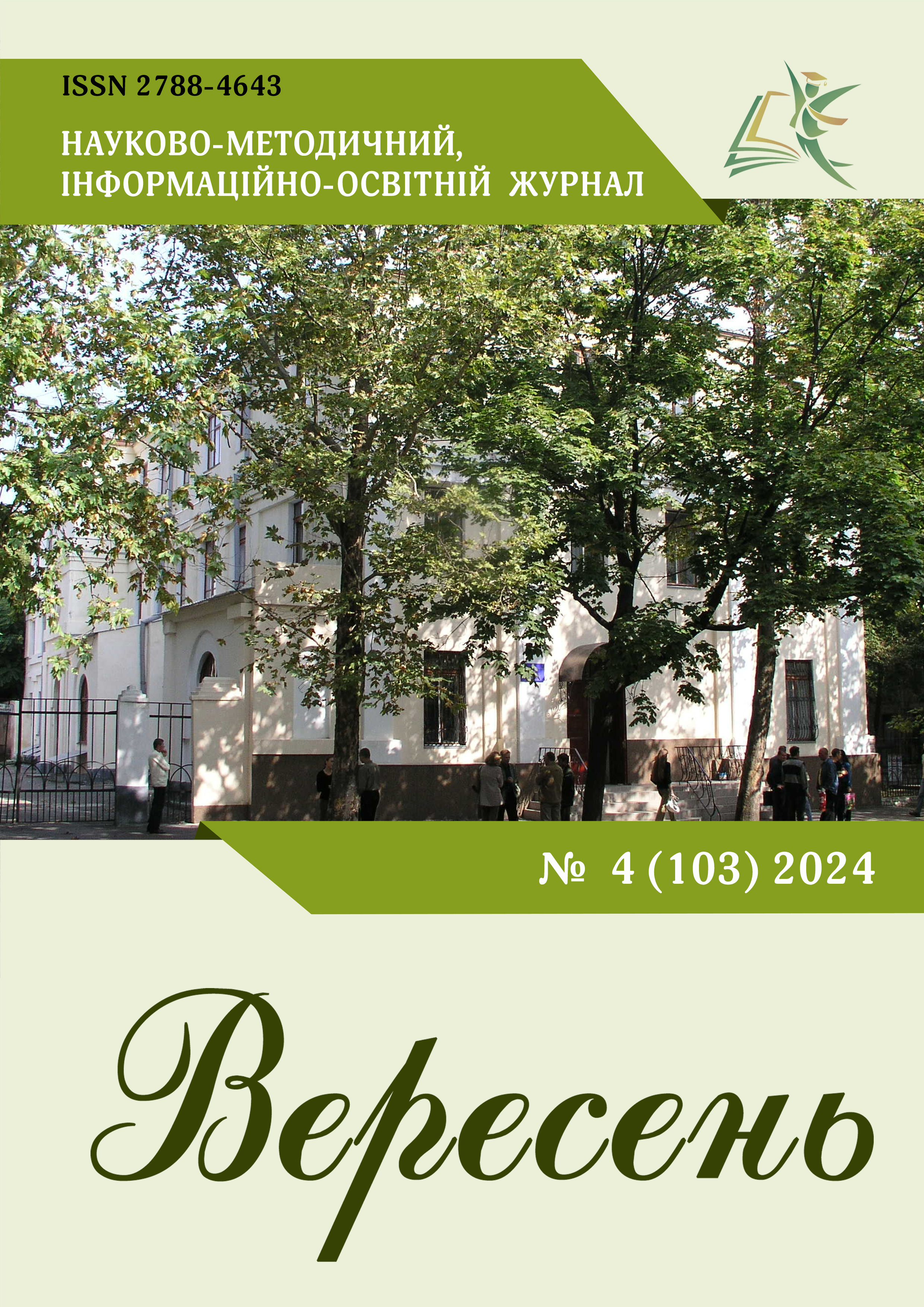SOME GENDER ISSUES OF HENRIK IBSEN’S PLAY «A DOLL’S HOUSE»
DOI:
https://doi.org/10.54662/veresen.4.2024.01Keywords:
female destiny, «gender issues», Henrik Ibsen, historical approach, «new drama», personality, public perceptionsAbstract
The gender issues in modern society gain significant weight, as the problem of self-identification of an individual is one of the keys to building a truly democratic society. Accordingly, the study of these issues from the historical perspective is able to provide a more effective, person-oriented solution to them. We consider the best works of Ukrainian and world literature to be one of the most important sources of this study, since outstanding writers reflected all aspects of modern life for them, raised and solved problems that were and are relevant in the general human dimension. Therefore, in their writings you can find the origins of many modern problems of society, including gender issues that existed at that time, although, of course, the terminology for their definition was different, which, of course, does not make their observations any less important. The article continues our previous studies of the drama «A Doll's House» by the outstanding Norwegian writer Henrik Ibsen, focusing on some gender issues of the world-famous work, which cemented Ibsen's fame as the creator of the «new drama», socio-psychological drama in general. Examining women’s fate during times when society openly neglected a woman’s right to be an independent person provides an opportunity to trace in a historical aspect some moments of confrontation between conservative social morality and women’s desire to fight for their personal rights, for the right to feel like a person and behave like a person. Contrary to the widespread public perception of a woman as a disenfranchised (on a social and moral level) being, Ibsen shows us the spiritual transformation of the main character, her desire to defend her right to self-respect and personal happiness. The article proves that such an understanding of the role of a woman by the playwright was innovative for its time and was an important step towards society’s rethinking of women’s fate and the role of women as individuals.
References
Gigi Engle, G. Weiss, S. What to Know About the “Hotwifing” Kink in Open Relationships. https://www.menshealth.com/sex-women/a38278676/what-is-a-hotwife/ (eng).
Gladishev, V. V. (2011). Dve sudbi (Nora Khelmer i Kristina Linne) [Two fates (Nora Helmer and Kristina Lynne)]. Zarubizhna literatura v shkolakh Ukrainy, 1, 11–14 (rus).
Gladishev, V. V. (2006). Izuchenie pesi G. Ibsena «Kukolnii dom» v kontekste estetiki «novoi drami» (X klass) [The study of H. Ibsen's play «A Doll's House» in the context of the aesthetics of «new drama» (X class)]. Osvitianski vitryla. Humanitarnyi almanakh, 3–4, 2005–2006 rr. Mykolaiv: vydavnytstvo «Ilion» (rus).
Gladishev, V. V. (2014). Odna khudozhestvennaya detal v drame Genrika Ibsena «Kukolnii dom» [One artistic detail in Henrik Ibsen's drama «A Doll's House»]. Zarubizhna literatura v shkolakh Ukrainy, 1, 61–64 (rus).
Hladyshev, V. V. (2011). Avtor, tvir, suspilstvo (Deshcho pro vyvchennia dramy H. Ibsena «Lialkovyi dim») [Author, work, society (Something about the study of H. Ibsen's drama «A Doll's House»)]. Slovianoznavstvo v kulturnomu prostori ХХI stolittia. Mykolaiv: MNU imeni V.O. Sukhomlynskoho, 68–76 (ukr).
Hladyshev, V. V. (2008). «Lialkovyi dim»: chy zakinchuietsia dramatychna diia? [«Doll's House»: does the dramatic action end?]. Pivdennyi arkhiv. Filolohichni nauky. Vypusk ХХХII. Kherson: Vydavnytstvo KhDU, 31–33 (ukr).
Hladyshev, V. V. (2006). Teoriia i praktyka kontekstnoho vyvchennia khudozhnikh tvoriv u shkilnomu kursi zarubizhnoi literatury [Theory and practice of contextual study of artistic works in the school course of foreign literature]. Mykolaiv: Vyd-vo «Ilion» (ukr).
Ibsen, H. Lialkovyi dim [A doll's house]. Retrieved from: https://www.ukrlib.com.ua/world/printit.php?tid=85 (ukr).
Kopystianska, N. Kh. & Todchuk, N. Ye. (2000). U poshukakh vidpovidei na vichni pytannia (Strukturni paraleli: Henrik Ibsen («Lialkovyi dim») – Ivan Franko («Dlia domashnoho ohnyshcha») [In search of answers to eternal questions (Structural parallels: Henrik Ibsen («Doll's House») – Ivan Franko («For the home hearth»)]. Vsesvitnia literatura v serednikh navchalnykh zakladakh Ukrainy, 4, 47–49 (ukr).
Mishchuk, V. I. (1993). Dim, u yakomu vianut pochuttia (Do vyvchennia sotsialno-psykholohichnoi dramy H. Ibsena «Lialkovyi dim» («Nora»). 10 klas) [The house in which feelings wither (To study the socio-psychological drama of H. Ibsen «A doll's house» («Nora»). 10th grade)]. Vidrodzhennia. Movy, literatury, istoriia narodiv Ukrainy v natsionalnykh shkolakh, 11, 11–13 (ukr).
Möbіus, P. (1909). Fizіologicheskoe slaboumіe zhenshchini [Physiologically retarded women]. Soch. D-ra P Möbіusa. Moskva: Sfinks (rus).
Mykhalska, N. & Shchavurskyi, B. (Eds.). (2005). Zarubizhni pysmennyky. Entsyklopedychnyi dovidnyk. [Foreign writers. Encyclopedic guide]. U 2 t. T. 1: A–K. Ternopil: Navchalna knyha–Bohdan (ukr).
Polnoe sobranie sochinenii Genrіka Ibsena. (1909). [The Complete Works of Henrik Ibsen]. Tom tretii. SPb: Izdanie T-va A. F. Marks (rus).
Shevchenko, L. O. & Kobikova, Yu. V. (2015). Hender u psykholohichnykh ta sotsialnykh doslidzhenniakh [Gender in psychological and social research]. K. (ukr).
Stepanova, E. R. (2017). Sutnist ta pokhodzhennia poniattia «hender» [The essence and origin of the concept of «gender»]. Suchasni problemy upravlinnia pidpryiemstvamy: teoriia ta praktyka, 269–271. Retrieved from: http://surl.li/uslcqk (ukr).
Tsiko, I. H. (2004). Pokaz shliakhu stanovlennia osobystosti v doli Nory. Urok za dramoiu H. Ibsena «Lialkovyi dim» [Showing the path of personality formation in Nora's fate. A lesson based on H. Ibsen's drama «A Doll's House»]. Zarubizhna literatura v navchalnykh zakladakh, 7, 37–38 (ukr).
Vypyrailenko, O. (2024). Vchyteli nazvaly uliubleni tvory uchniv 5–9 klasiv iz zarubizhnoi literatury: sered nykh pro smert i kontstabory [Teachers named the favorite works of 5th-9th grade students from foreign literature: among them, death and concentration camps]. Moia shkola. 2024, 1 lypnia. Retrieved from: http://surl.li/bhctsu (ukr).




